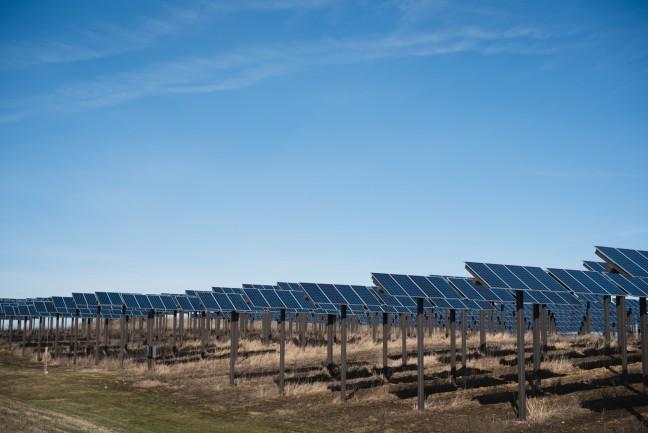The Public Service Commission of Wisconsin unanimously rejected proposals Nov. 9 from both Wisconsin Power and Light — known as Alliant Energy — and Madison Gas and Electric to alter net metering practices, according to a press release from Renew Wisconsin.
Net metering is the practice of paying solar panel owners for the electricity their panels they produce by sending excess electricity to the public power grid, according to Wisconsin Public Radio. Renew Wisconsin’s release said net metering is the most important policy that Wisconsin can utilize to compensate rooftop solar panel owners and encourage others to invest.
MGE’s proposal would have combined compensation rates for small and large solar energy systems, reducing the earnings of small business and private owners who have invested in solar energy, according to WPR. The proposal from Alliant Energy would change existing compensation rules to pay contributors based on when their solars are producing excess energy, paying more for electricity generated during “peak hours,” WPR said.
According to Renew Wisconsin Clean Energy Deployment Manager Michael Vickerman, these proposals would have resulted in an increase in the time needed to break even on one’s original solar panel investment. As a result, the proposals could result in a lower solar energy adoption rate.
In July, both Alliant Energy and MGE released their proposals to change traditional net metering according to WPR.
“Under traditional net metering, every kilowatt hour produced by a solar system is credited at the same energy rate,” Vickerman said. “Both utilities proposed an inflow outflow structure, which values each kilowatt hour that the customer produces at the retail energy rate, but any electricity that flows out to the grid will be credited under a different formula.”
The primary concern of groups like Renew Wisconsin was the proposals would result in less individuals adopting solar energy. According to Forbes, in 2023, the average cost of a six-kilowatt solar panel system in Wisconsin was $13,009. On average, it takes around 10 years to break even on this investment.
In 2020, Dane County published a Climate Action Plan that aimed to reduce greenhouse gas emissions by 50% by 2030 and be on the path to carbon neutrality by 2050. One of the means to achieve these goals, according to the plan, is to use solar to produce a third of the County’s energy supply by 2030.
Dane County Office of Energy & Climate Change Director Kathy Kuntz said a lower solar adoption rate would interfere with reaching Dane County’s climate goals.
“We also thought that the proposals were confusing – that it was complicated to understand how these new rates would work” Kuntz said. “And my goal is to help us achieve our climate ambitions, and everything that gets in the way of that is a problem for me. And so if rates get more complicated, then that’s a barrier to people moving forward with solar because it’s just harder to understand.”
The proposals also posed a challenge to businesses and families working with a tight budget, 350 Wisconsin Co-Executive Director Emily Park said. Traditionally, net metering helped offset the cost of solar panels through credits that could be generated from excess electricity.
The new proposals would reduce the amount individuals would earn from their solar panels. Park said this means the new proposals would affect low- to middle-income families the most.
“If you’re a low- to middle-income family or if you’re a small business or if you’re a church community and nonprofit, you’re working with a pretty tight budget,” Park said. “And if net metering is the thing that helps you afford those solar panels, then it’s critical. Without these kinds of programs to support everyday people getting solar panels, it’s going to be limited to the people who have all that cash on hand.”
Park said without net metering, access to solar energy will be reserved for large businesses and wealthier households.
This is not the first time utility companies have campaigned against net metering. According to The Washington Post, representatives from the utilities industry believe net metering helps the owners of solar panels while raising costs for other people who utilize the electric grid. Trade organizations like the Edison Group have supported legislation to make net metering illegal in multiple states.
According to Vickerman, MG&E’s proposal would have resulted in outflow decreasing to four to five cents a kilowatt hour. Alliant’s Energy’s proposal also would have resulted in an outflow decrease to around 12 cents per kilowatt hour.
The PSCW’s decision provided a status quo that will hold for the next two years, Vickerman said. Until then, both Alliant Energy and MG&E will have to adhere to current net metering protocols.
“We support wholeheartedly support the Commission’s decision to keep net metering as it is” Vickerman said. “And when the time comes to adjust the service, we’re ready to negotiate and ready to provide the next example of the compensation formula, but we don’t have to do it this year.”
Editor’s Note: This story was updated to correct Michael Vickerman’s title at RENEW Wisconsin.


